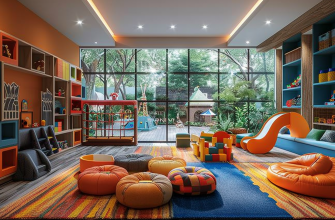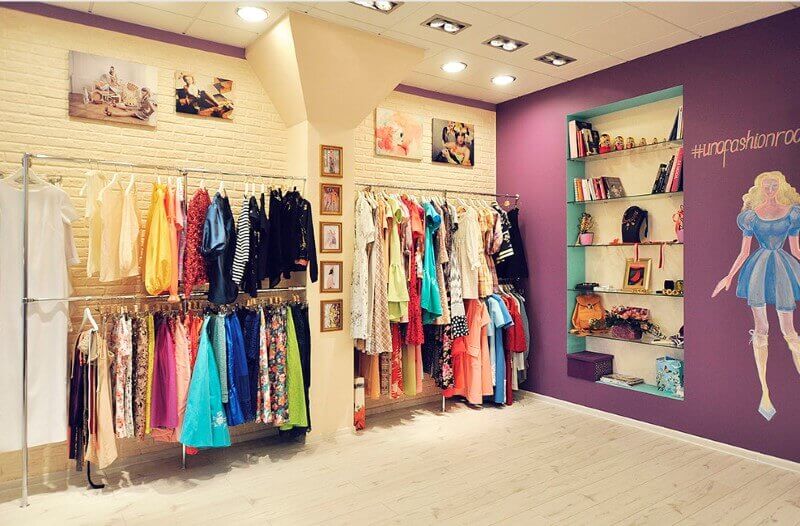Opening your own speech therapy room is an important step that allows you to help children and adults with speech disorders and at the same time to realize yourself in the profession. Today, the demand for the services of a speech pathologist is constantly growing: many families have children with speech problems, and there are often not enough opportunities to get help in state institutions. Private practice of a speech therapist in Moscow can become a successful and socially important business. In this article we will consider in detail what you will need to open a speech therapy office or a small speech therapy center (mini-center) in the capital. We will discuss choosing a form of registration (sole proprietorship or LLC), requirements for premises, the need for a license, documents and qualifications, equipment and furniture, basic costs, marketing and interior design.
- Business registration: sole proprietorship or LLC?
- Licensing of speech therapy activities
- Room requirements and sanitary norms
- Mandatory documents and qualifications of a speech therapist
- Equipment and furniture for speech therapy room
- Financial costs of opening an office
- Marketing and customer acquisition
- Interior design and comfortable environment
Business registration: sole proprietorship or LLC?
Choice of legal form - the first step towards opening a speech therapy room. Depending on your plans, you can register as an individual entrepreneur (IE) or open a limited liability company (LLC). Each option has its pros and cons, especially in the context of speech therapy practice:
-
Individual Entrepreneur (IE): Easier to register and maintain. For a small business, a sole proprietorship is considered an easier and more profitable option - less accounting reporting, lower business support costs and taxes. You can open a sole proprietorship quickly (in ~5 days), including online and without state duty. A sole proprietorship is ideal if you plan to work independently, providing services in person. In the field of speech therapy, this means that you yourself conduct classes with children or adults and do not hire other professionals. To the significant disadvantage of the sole proprietorship include full financial responsibility with personal property. In addition, a sole proprietorship cannot legally hire medical personnel, if it comes to a medical license. However, for speech therapy activities provided personally, the big plus of a sole proprietorship is the absence of the need to obtain an educational license (more on this below).
-
Limited Liability Company (LLC): Suitable for opening a speech therapy mini-center, especially if it is planned to provide different services and hire employees (for example, several speech therapists, psychologist, neurologist, etc.). LLC gives more opportunities for growth: it is easier to expand the range of services, to open several offices, to conclude contracts with other organizations. Plus - limited liability (you risk only the authorized capital and property of the company, the minimum authorized capital of 10 thousand rubles). However, maintaining an LLC is more complicated: more accounting requirements, the need to keep records or hire an accountant, mandatory maintenance of cash and reporting. It also takes more time to register an LLC, requires a legal address and payment of state duty of 4,000 rubles. It is important to take into account that if you plan to hire other speech therapists or doctors, to work as an educational center, then the form of LLC will almost certainly need a license for activities (educational and/or medical).
sole proprietorship without employees allows you to start with minimal formalities. For example, legal advice confirms that when registering as an IE and personally providing speech therapy services for speech correction, a license is not required. This is due to the fact that under the law, an educational license is not necessary for individual entrepreneurs who conduct activities directly themselves. Thus, if you are a certified speech therapist and are going to conduct classes on your own, you can work as a sole proprietor without a license.
LLC or sole proprietorship with employees. If, however, you open mini-center - i.e. you plan to have other speech therapists or related specialists on staff - your activity actually becomes an educational service provided by the organization. In this case it is necessary to obtain a license for educational activities. When registering an LLC under the speech therapy center is a mandatory step. In addition, LLC allows you to obtain a medical license, if you are going to provide medical services (for example, speech therapy medical assistance) and hire doctors. A sole proprietorship can also obtain a medical license, but it must be a doctor itself and will not be able to officially employ another doctor.
Conclusion: For a small private office It is often sufficient to register a sole proprietorship - it is cheaper and easier to manage. For of a multi-specialty center it is better to register an LLC in order to hire staff legally and obtain the necessary licenses. In any case, registration is a mandatory step: without registration of an IE or LLC, it is impossible to provide services legally.
Licensing of speech therapy activities
The issue of licensing is one of the most important when opening a speech therapy room. Here much depends on the format of work and the list of services:
-
Educational License: If you're providing educational services (remedial classes with children, speech development, school preparation, etc.) as an organization or with the involvement of other teachers, a license from the Ministry of Education of the Russian Federation is required. Logopedic classes with children officially refer to corrective and developmental educational programs, so they qualify as educational activities. The Law "On Education" says that any educational activity is subject to licensing, except for those conducted by individual entrepreneurs personally. That is, if you have LTD. or IE with hired teachers, it is necessary to obtain an educational license. The license is issued for a specific address, and in order to obtain it, the premises must meet the requirements of sanitary norms (a conclusion of Rospotrebnadzor is required). Usually the process includes preparation of educational programs, applications, information about the material and technical base and submission of a package of documents to the Department of Education of your region. In Moscow, licensing of educational activities is handled by the Department of Education of Moscow. The timeframe for obtaining a license can be several months.
-
When a license is NOT needed (education): If you work as IE in personIf you do not register yourself as an educational center, i.e. you simply provide speech therapy services directly to clients, then the law exempts you from the need to obtain an educational license. For example, a privately practicing speech therapist-defectologist who conducts classes at home or in a small one-on-one office may operate without a license. However, it is not allowed to call its activities an educational center or school, to issue official documents on education, etc. In fact, it is equated to tutoring/counseling. Many beginning speech therapists start their work in this way. Important: The absence of a license does not exempt from the general requirements for sanitation and safety, as well as the specialist's specialized education.
-
Medical License: Speech therapy services are at the intersection of pedagogy and medicine. If you plan to provide speech therapy services (e.g., adult speech rehabilitation after stroke, working with patients with swallowing disorders, speech therapy services), a medical license is required. A medical license is required if the service is officially classified as medical (for example, speech therapy may be part of medical rehabilitation). In such a situation you will have to comply with the norms of the Ministry of Health: to have a medical education of a specialist (speech therapist or speech pathologist with medical training), medical rooms, equipment, contracts with the services of disposal of medical waste, etc. The requirements for providing medical speech therapy services are much stricter: you need sinks in each room, separate ventilation, rooms for storing waste, contracts with service organizations. Usually private speech therapy centers small businesses are limited to an educational license if they work with children on speech correction. A medical license is obtained less frequently - for example, if the center specializes in speech therapy work with medical diagnoses and has a neurologist, otolaryngologist, psychiatrist, etc. on its staff. In this case, more often choose the form of LLC (IE can not hire doctors, as mentioned). Keep in mind that to obtain two licenses at once - both educational and medical - is quite laborious. In practice, they first open a center, start work on the educational part, and then add a medical license if necessary.
-
Early Childhood Education License: If you position your center as, for example, a speech therapy kindergarten or run preschool education programs, this is a separate licensing category (preschool license). For the purposes of this article, we are focusing on speech therapy services of an additional nature (speech correction, classes with children outside of school/garden, assistance to adults), so such a license is usually not required unless you are opening a full-fledged educational institution.
Total licenses: If you are individual speech therapist without staffIt is possible to work without a license, registering the services as consulting services. If you open center or mini-centerWhen planning groups of children, hiring staff, or officially offering educational programs, an educational license is required. If the list of services includes something from the health sector (e.g., medical rehabilitation of speech), a license from the Ministry of Health for medical services will be required in addition. For most private speech therapy rooms focused on speech correction for children, the main issue will be the educational license.
Room requirements and sanitary norms
Room selection - one of the key stages of preparation for opening a speech therapy office or center. Both convenience for clients and the possibility of complying with all the regulations depend on the right choice of premises. In Moscow it may not be easy to find suitable premises, but there is no need to hurry. Let's look at the basic requirements and recommendations:
-
Location: The ideal is first floor of the first line building (separate entrance from the street), especially if creating a mini-center. This facilitates access for parents with children and attracts casual customers with signage. It is desirable to choose residential areas where there are many families with children, near kindergartens, schools or large residential complexes. Proximity to public transportation stops or the subway is a big plus. In Moscow's dormitory districts, good locations are near new residential complexes: there the concentration of young families is maximum. If you plan to work with adults as well, a location near a polyclinic, health center or business center can attract this audience as well.
-
Square footage and layout: Even for a private office, it is better to have at least 15-20 m² per class area to comfortably accommodate everything you need. If you equip mini-centerThe area depends on the number of offices. Remember the rule: "it is not the total area that brings money, but the rooms" - i.e. several small rooms are better than one huge hall. For example, you can allocate: a room ~20 m² for individual classes, a larger room (30-40 m²) for subgroup or group classes, plus a waiting area and a bathroom. If group classes with children are planned, health regulations recommend about 4 m² per child, and a total room size of 16 m² or more. In each office (class room) should have a window - natural light enhances perception and requirements generally prohibit practicing with children in rooms without windows. The layout should include waiting room for parents near the entrance or reception, and don't forget the bathroom (if a center, preferably separate for staff and visitors).
-
Sanitary Regulations (SES): When working with children, the premises must comply with sanitary and epidemiological requirements, which are controlled by Rospotrebnadzor. Before opening, it is advisable to obtain SES (Rospotrebnadzor) conclusion This is required for licensing and will also protect you from fines. The main points of sanitary norms for a speech therapy room/center:
-
Availability of a source of water and sewage. Licensed centers often require sink hand washing facilities in each room or at least in the immediate vicinity. In any case, children and practitioners need to be able to wash their hands before class, i.e. either an equipped sink or access to a bathroom with a washbasin.
-
Separate entrance and vestibule. For children's centers, Rospotrebnadzor usually requires that the entrance to your space be separate (not through a residential entranceway without a permit) and have a vestibule - an intermediate room between the street and the office so that cold air doesn't come directly inside.
-
Ventilation and lighting: The room should be ventilated, preferably with air vents/windows. If you are applying for a medical license, you need a separate ventilation system, not connected to the general ventilation system. Lighting should be sufficient, lamps - without flickering, with a comfortable brightness. Lighting levels are standardized for children's activities, so install enough fixtures.
-
Coatings and finishes: The walls and floor should be made of materials suitable for regular damp cleaning with disinfection. The most common materials are paint or washable wallpaper on the walls and linoleum on the floor. Carpeting is undesirable (only in play areas as individual mats that can be cleaned). Soft flooring is recommended in childcare facilities linoleum floorwhich will cushion the impact of a fall and makes no noise.
-
Bathroom: Toilet and washbasin facilities are a must. Ideally, a separate toilet for visitors (children and parents) and staff, especially if required by licensing authorities. Equip the bathroom with a child seat or a potty for toddlers if you work with preschoolers.
-
Cleaning and sanitizing: There should be a cleaning regime - daily wet cleaning, quartzing or use of recirculators (air disinfectors) as needed. In the centers it is important to keep a schedule of cleaning and filter replacement, to control the availability of disinfectants. All this is usually checked by Rospotrebnadzor during routine inspections.
-
-
Fire Safety: In addition to sanitary regulations, Ministry of Emergency Situations (fire inspectorate) checks the premises for compliance with fire safety requirements. Fire extinguishers, fire alarms or at least a notification system, and evacuation plans on the walls are required. If repairs are made - finishing materials must be fire-resistant (at least class G1-G2). At the entrance - fire exit (for the first floor is the main entrance). Also, electrical wiring standards must be met (serviceable wiring, sufficient power for your appliances). Obtaining a certificate from the fire inspectorate is desirable before you start work, especially if you open the center and invite a lot of visitors.
-
Premises documents: After finding the right space, enter into a lease (or buy the property, then there will be title documents). It is better to conclude a long-term lease agreement - from 1 year or more, in order to reduce the risks of sudden termination. Take into account that landlords in Moscow sometimes rent in the beginning for 11 months (in order not to register the contract in Rosreestr), but try to agree on prolongation or immediately on a long-term contract - stability is important for your business. Notarization of the contract is not necessary, but a copy of the contract may be requested by the authorities during licensing. Contracts with public utilities are also concluded - for electricity supply (usually it is done automatically through the landlord), garbage collection, cleaning of the territory, etc... The license may require: sanitary-epidemiological conclusion (Rospotrebnadzor), firemen's inspection report, contracts for disinfestation/deratization, contract for waste removal, etc. - check the list with the local licensing authority.
Tip: When picking a room, make a list of refinements in advance. You may have to do a little renovationPaint the walls the right color, build a children's corner, install a sink or partitions. Budget for these costs. In the section on costs, we will give you an example of an estimate for the renovation.
A room that meets all the requirements is the key to a successful launch. You need to comply with all the regulations especially strictly if you want to obtain a license (educational or medical): without a Rospotrebnadzor report, no license will be issued. But even if you work without a license, compliance with sanitary rules is your responsibility to your clients and your reputation.
Mandatory documents and qualifications of a speech therapist
To open a speech therapy office, it's not enough just to register a business and rent a room. You need to prepare a number of documents and make sure that your qualification meets the requirements. Here's something to consider:
-
Diploma and Education: A speech therapist is a specialist with specialized education. Usually it is a higher pedagogical education in a specialty "Logopedics." or "Defectology." (e.g., a bachelor's or master's degree in speech pathology from a pedagogical university). A speech therapist (medical education + specialization) may be required to work with adults after a stroke. Mandatory requirement - You (and your speech and language therapist staff, if you have them) should have a document confirming your qualifications as a speech and language therapist. It makes sense to attach a copy of the diploma to internal documentation and always have it handy. Additional certificates of professional development courses and trainings are also useful - they increase the confidence of clients.
-
Medical Records: Since a speech therapist works with children and adults in close contact, especially with children, the law stipulates that the specialist should have a valid medical book. A medical book is a document confirming that you have undergone a medical examination, are free of infections, and have the necessary vaccinations (e.g. measles, diphtheria, hepatitis, etc.). The results of tests and doctors' marks are entered into the medical book. In Moscow, a medical book can be issued through Rospotrebnadzor hygiene training centers or through accredited clinics. Vaccination certificate is also needed - for example, measles immunization is now required for employees who come into contact with children. These documents are mandatory for all employees who will be working with children. Rospotrebnadzor draws attention to this during inspections, and for an educational license, a list of employees with their education and medical certificates is included in the package of documents.
-
Registration documents: After opening a sole proprietorship or LLC, you will have: a certificate of registration (a record sheet of the Unified State Register of Legal Entities or the Unified State Register of Legal Entities), a tax registration certificate (INN), the Articles of Association and the decision to establish (for LLCs). These documents are kept by you and copies may be placed in the "consumer corner." (information stand for clients). Also, if you have received licenses (educational, medical) - the originals are kept with you, and a copy with attachments should be available for review by clients.
-
Consumer's Corner: In any service center it is recommended to arrange a stand with information for clients. Usually copies of basic documents are placed there: business registration certificate, license (if available), rules of service provision, book of reviews and suggestions, contact information of regulatory authorities. For a speech therapy room, it is especially important to show qualifications: copies of diplomas, certificates should be posted in a prominent place. Parents coming to the classes should see that they are seeing a qualified specialist. It also makes sense to post the schedule, list of services and prices, policy on processing personal data and other legally required information. The profile recommendations even mention the whole "office passport" - a document with basic data: room area, lighting, list of employees and their education, working and cleaning regimes, list of methodological materials and literature. Such information, posted openly, increases credibility and satisfies the requirements of inspection bodies.
-
Other documents: If you are an LLC or have employees, be sure to enter into a employment contracts with all employees. Teachers should not be hired on an unpaid basis or on a "part-time" basis - this is fraught with fines and license revocation. It is also necessary to develop job descriptions for a speech therapist, administrator, etc., safety log, orders on appointing those responsible for fire safety and electrical safety (if required). To handle money, you will need an online cash register and its registration, as well as the connection of acquiring to accept card payments. Consider and customer agreement - an offer or a standard contract for the provision of services, which you will conclude with parents (it specifies the rights/obligations of the parties, duration of classes, cost, payment procedure, responsibility). By the way, IE has the right to conclude contracts with clients even without a license for educational activities, if he provides services himself - but in the contract then the emphasis on the advisory nature of the service.
-
Programs and Techniques: If you are applying for an educational license, you will need educational programs The speech therapy programs you will be working with. You need to develop them or take ready-made ones and adapt them to your work (for example, sound correction programs for children of a certain age). These programs are approved by the supervisor (in this case, you) and are also submitted as part of the license application. Even if you work without a license, having methodological programs and lesson plans is a sign of professionalism. In addition, it is more convenient for organizing the process and tracking student progress.
-
Qualifications for working with adults: Separately note that if you plan to work not only with children, but also with adults, your qualifications should allow it. Typically, a speech and language therapist is trained to work with different categories. Adults may present with problems such as stammering, speech disorders following injury or stroke, voice problems (e.g. for singers, lecturers) or simply to develop diction. It may make sense to take additional courses specifically in neurorehabilitation of speech or rhetoric, depending on what kind of adult clients you see in your target audience. If the cases are complex (aphasia after a stroke, etc.), collaborate with doctors and have the contacts of a neurologist or psychotherapist on hand. This will increase the level of service of your office.
By preparing all the necessary documents and ensuring your own qualifications, you will lay a solid foundation for client confidence and successful completion of inspections. Tip: Organize all paperwork in a separate folder and make copies in case of an unscheduled inspection or to be made available to parents upon request.
Equipment and furniture for speech therapy room
Equipping a speech therapy room is an investment that directly affects the quality of lessons. Thoughtfully selected furniture and equipment will create a comfortable environment for children and adults and help in conducting effective exercises. Let's make a list of necessary equipment and approximate prices.
Basic furniture:
-
Table and chairs for class. It is better to choose a table with adjustable height or one that is comfortable for both the child and the adult. There are children's tables with adaptation to the child's height. If there will be kids in the office, you can provide a small children's table and chair, and for schoolchildren and adults - the usual office table. Chairs are also selected according to age: for children - with a step or adjustable height, for adults - comfortable office chairs. Approximate cost: quality children's growing chair - 5-7 thousand rubles, table - 10-15 thousand rubles, a pair of ordinary chairs - 5 thousand rubles.
-
Waiting room furniture: If parents are present or waiting, it is important to provide them with a comfortable place to sit. A small sofa or soft armchairs will do. For an adult client coming for a session, the waiting area should also be cozy. Cost: a small sofa - ~20 thousand rubles, or 2 upholstered armchairs for 10 thousand rubles.
-
Cabinets and shelving: A speech therapy room is usually filled with lots of games, aids, cards, and books. You need lockers or open shelving to store them. Also the cabinet is needed for documents. If the office is small, you can hang shelves on the walls. Cost: rack IKEA or similar - 5-10 thousand rubles, cabinet for manuals - 10-15 thousand rubles.
-
Large wall mirror: One of the mandatory attributes large mirror at the level of the child, in front of whom a chair is placed. In the mirror the child observes the position of the tongue and lips during articulation exercises. The mirror should be safe (better acrylic or with a film so that it does not break into fragments). Cost: special speech therapy mirror ~5-8 thousand rubles, or a large mirror in a frame - 3-5 thousand rubles.
-
Small hand mirrors: For individual and group lessons, you can use several small mirrors for the child to hold and look at the articulation. They are inexpensive (200-500 rubles each), you can buy cosmetic folding mirrors.
-
Blackboard (classroom or marker board): Useful for explaining materials, drawing diagrams of the speech apparatus, and writing exercises. A wall-mounted marker board with a set of markers. Either an easel board, with a marker on one side and a magnetic marker or paper board on the other. Cost: wall board 90x120 cm - ~4-6 thousand rubles, children's easel - 3 thousand rubles.
-
Computer and Multimedia: The modern speech therapist makes extensive use of digital aids. Therefore, it is necessary PC or laptop with access to educational programs, internet, possibly with a touch screen for interactive games. For demonstrations. projector and screen or a large monitor/TV that shows speech therapy cartoons, articulation exercises, presentations. At first, a laptop (~40 thousand rubles) and an inexpensive projector (30 thousand rubles) or TV (30-50 thousand rubles) are enough. You can also use tablet with speech therapy applications (15-20 thousand rubles).
-
Stopwatch: In speech therapy exercises, it is sometimes necessary to time things (e.g. breathing exercises, speech games for time), so a simple stopwatch or timer is very useful. Nowadays they often use a timer in the phone, but a separate device (or an hourglass as a play option) can also be kept. Cost: stopwatch 500 rubles, a set of hourglasses - 300 rubles.
Special equipment and aids:
-
A set of speech therapy probes and instruments: Speech therapists use special probes, spatulas, vibromassagers for the tongue, silicone spoons, massage brushes, etc. for the production of sounds. Such speech therapy kit usually costs 3-5 thousand rubles. It is necessary for the correction of pronunciation, massage of articulation muscles.
-
Developmental games and toys: The office should be equipped with teaching materials According to the methodologies you are working with. Minimum set:
-
Cards with pictures to automate sounds, vocabulary development.
-
Sound bingo, games for phonemic hearing.
-
Manuals for the development of fine motor skills: lanyards, mosaics, jigsaw puzzles, sorters. For example, a labyrinth stand for hand training, games with clothespins and counting sticks.
-
Dolls, toys for role-playing games that help develop speech (the doll can "speak wrongly" and the child learns to pronounce it correctly, etc.).
-
Board games for the development of communication and speech.
-
Wall mirror with magnets or interactive panelsThere are ready-made speech therapy panels, such as the Antoshka complex with pronunciation games or a wall-mounted speech alphabet. These are optional, but very useful and attractive to clients, although they are expensive (from 50 thousand rubles).
By going around specialty stores, you can pick up a lot of games. Also use well-known sets such as "speech cards." - They are published by many publishing houses. On average, you should budget 50-100 thousand rubles to start purchasing games and materials to cover different areas of work (pronunciation, vocabulary, grammar, reading, motor skills). Remember that some of the aids can be made independently (pictures, handouts) with minimal costs.
-
-
Books and methodological literature: The speech therapist's library is your working toolbox. Collect methodologies, training manuals, exercise books, children's books (poems, rhymes, reading texts). This is both your reference collection and your classroom materials. The costs depend on the materials you have, you can start with 5-10 thousand rubles for books.
-
Other: Stationery (paper, pencils, paints, scissors, glue - for crafts with kids), small mirrors (mentioned above), art kit (plasticine, paints - often speech therapists use drawing and modeling as part of their lessons). Also visual aids - posters with articulation exercises, diagrams of the structure of the speech apparatus that can be hung on the wall for explanations.
-
Water and hygiene: The office should definitely have drinking water for the children. It is good to put water cooler(rent a cooler ~1-2 thousand rubles/month or purchase ~10 thousand rubles, plus bottles of water at ~300 rubles). Also prepare antibacterial gels for hands, wet wipes. In case of small children - disposable bibs, wipes.
-
Detergents: If there is a sink in the room, you need soap (liquid, preferably hypoallergenic children's soap), paper towels or electric dryer, antiseptics for treating toys. It is important to keep toys clean - washable toys should be washed regularly, and soft toys should be washed.
Note: Cabinet equipment can be expanded gradually. At the start, purchase minimum required for operationThe main thing is to have a basic set that allows you to conduct classes in different areas of speech correction. The main thing is to have a basic set that allows you to conduct classes in various areas of speech correction. All the equipment should correspond to the methods you use.
Below is a table with a sample list of equipment and furniture and their costs for the single room (estimates for Moscow for the current year):
| Category | Name | Approximate cost, rubles. |
|---|---|---|
| Furniture | Speech therapy table (adjustable) | 12 000 |
| Chairs (2 children's growing chairs, 2 regular chairs) | 15,000 (combined) | |
| Children's corner (table + 2 chairs) | 8 000 | |
| Sofa or waiting chairs | 20 000 | |
| Racks and cabinets for manuals | 15 000 | |
| Speech therapy wall mirror | 5 000 | |
| Wall marker board | 5 000 | |
| Technique | Laptop or PC | 40 000 |
| Projector + screen (or LED TV) | 30 000 - 50 000 | |
| Printer/MFP (for printing materials) | 10 000 | |
| Water cooler | 10,000 (or rent 1,500/month) | |
| Speech therapy tools. | Set of speech therapy probes, spatulas | 5 000 |
| Hand mirrors (several pieces) | 1 000 | |
| Game stopwatch/timer | 500 | |
| Didactic materials | Cards, manuals, handouts | 10 000 |
| Board and educational games | 20 000 | |
| Books and teaching aids | 10 000 | |
| Soft toys, dolls, marionettes. | 5 000 | |
| Set for creativity (modeling, drawing) | 3 000 | |
| Other | Stationery, consumables | 3 000 |
| Antiseptics, soap, housewares. | 2 000 |
Prices are indicative and may vary depending on quality and brand. Many items can be found cheaper, especially games and books (they are often bought gradually). For a mini-center with several offices, equipment costs are multiplied by the number of offices, plus equipment for the waiting room and reception.
Note that specialized equipment (e.g., interactive speech therapy panels, tablets with software) is not included here - these are optional but desirable items that can elevate your classroom over time.
A useful approach is to look at catalogs of products for speech therapists. There are online platforms where you can pick up mandatory items for the office and even get advice on equipment. Choose what really comes in handy in your work.
Financial costs of opening an office
When opening a speech therapy office in Moscow, it is important to soberly evaluate budget - both initial investments and regular monthly expenses until the center becomes self-sufficient. Let's look at the main cost items and estimate the amounts (for two options: a modest individual office and a mini-center with several employees).
1. Registration and legal costs:
-
IP: State duty 0 rubles (for electronic registration) or 800 rubles on paper. A notary is not needed, you can manage on your own or through the MFC. Also, immediately after registering an IE you will have to pay fixed contributions for yourself (about 45 thousand rubles a year, but you can pay them quarterly).
-
LTD: State duty 4,000 rubles, authorized capital of at least 10,000 rubles (this money can then be spent on the needs of the business). Perhaps the cost of services of a lawyer or registration center (5-10 thousand rubles, if you do not register yourself). You will also need to open a current account in a bank (many banks do this for free for new entrepreneurs).
2. licensing:
-
Without a license (sole proprietor, self-employed): 0 rubles. - you can immediately start your activities after registration.
-
Educational License: The state duty for consideration of the application is ~7,500 rubles. Plus preparation of documents - you can do it yourself, or pay a consultant or an intermediary firm (their services are 30-50 thousand rubles, but in simple cases you can do it yourself). It will also take money to fulfill pre-license requirements (bringing the premises into compliance) - but we include these expenses in repairs/equipment.
-
Medical License: The state duty is 7,500 rubles, but there are many more additional costs and requirements (medical equipment, special conditions). For a start-up, they often try to do without it.
3. renting the premises:
-
Deposit: Usually, renting commercial real estate in Moscow requires a deposit (deposit) of 1-3 months rent in advance. Put down ~2 months of rent at once as frozen funds.
-
Rental rates: Strongly depend on the area and the meterage. In Moscow, a small premises of 20-30 m² in a dormitory district (the first floor of a residential building) can cost about 1,500-2,500 roubles per 1 sq.m. per month. That is, for 20 m² - ~40,000 rubles per month. Closer to the center prices are higher: 3 000-5 000 rubles/m² and more. In prestigious locations (center, CAO) even a small office will cost 60-100 thousand rubles per month. For mini center (e.g. 80-100 m²) the rent can be 100-200 thousand rubles/month and more. For example, entrepreneurs in the Kirov region report that renting premises of 140 m² cost them 300 roubles/m² thanks to the choice of a bedroom district. In Moscow, even on the outskirts of the rate is several times higher. Let's assume for the sake of calculation: 20 m² office - 50,000 roubles/month, 80 m² mini-center - 120,000 roubles/month.
-
Repair and Preparation: If the room requires repair (painting, installation of doors, plumbing), for a small room you can settle in 100-200 thousand rubles (cosmetic repair). For a center (several rooms, remodeling) - 300-500 thousand rubles. In one of the cases of opening the center for repair and redevelopment took ~350 thousand rubles. In Moscow, the prices for repair services are higher, so if you need to seriously redesign the premises (to make partitions, water in the offices, ventilation) - the amount may be 1 million. But for simple painting and preparation, let's lay down: sole proprietor's office - 150 000 rubles. repair, mini-center - 400 000 rubles.
-
Equipment and furniture: Calculated in the previous section. Based on the minimum estimate: per room about 150-200 thousand rubles (if equipment, furniture and manuals together). For the center with 3 offices and a waiting room - about 500-600 thousand rubles. For example, those who opened the center in 2019 spent ~420 thousand rubles on equipment, furniture and office equipment.
-
Signage and facade design: Take into account the cost of signage, signposts. In Moscow, signage approval is also paid for. A simple light box may cost 20-30 thousand rubles, volume letters - 50-100 thousand rubles. In the budget example (Kirov) on the sign, alarm and video surveillance laid ~120 thousand rubles. In Moscow can be estimated similarly or higher. To start with a modest signboard is enough, say 30,000 rubles.
4. Personnel and payroll:
-
If you work alone (IE without employees), then there is no permanent payroll burden - you receive income from clients yourself. But put money aside for the first few months of life - for your own personal expenses while the business is being promoted.
-
If there are employees: The mini-center may have an administrator, several speech therapists, and possibly an outsourced accountant. Salaries in Moscow: a speech therapist may receive a salary + percentage, for example a salary of 20,000 + 20-25% from classes. Administrator - about 30 000 - 40 000 rubles per month. Perhaps you yourself at first will be both administrator and methodologist, then you can save money. However, take into account that when hiring even 2-3 employees payroll will easily amount to 100-150 thousand rubles / month and more (depending on the load and qualifications of specialists). In one example, a center with five employees spent 220 thousand rubles per month on salaries (in the region; in Moscow it will be higher). Don't forget taxes and salary contributions (~30% on top of the official salary).
5. Advertising and promotion:
-
Initial Marketing: you will need a budget for creating a website, printing polygraphy, online advertising. Approximately: creation of a simple business card site - 20-30 thousand rubles (or independently, which is cheaper), business cards, flyers - 5 thousand rubles, targeted advertising in social networks - from 10 thousand rubles for the first time. You can also lay the budget for promotion in Yandex / Google (contextual advertising) - for example, 15-30 thousand rubles. per month at the start. Total for advertising launch it is reasonable to lay down 50-100 thousand rubles. If the budget is limitedYou can start with free methods (see section on marketing) or small investments (e.g. just leaflets and social media).
-
Signage we've already accounted for separately indoors.
6. Other expenses:
-
Utilities: rent often does not include utilities. Electricity, water, heating - can be separate. For a small office it is not much (5-10 thousand rubles/month), for a larger center (15-20 thousand rubles). In the example of 140 m², utilities were ~17 thousand rubles/month.
-
Communications and Internet: Internet for online cash register and work ~500-1000 rubles/month. Mobile communication - according to the tariff.
-
Accounting: If the sole proprietorship is simplified, you can do it yourself or use a service such as "My Business" (about 1-2 thousand rubles/month). For LLCs, an accountant is often outsourced: 5-15 thousand roubles/month.
-
Taxes: Depends on the system (preferably STS 6% from income or 15% from profit; for an IE, a patent is possible). For example, a center on the simplified taxation system "income-expense" pays 7.5% from profit. In the first months, the profit is small, but the minimum on contributions of the sole proprietor still pays. In general, for tax payments, focus on ~6-7% of revenue, when the income goes.
-
Unforeseen: Legal services, minor repairs, replacement of equipment, purchase of consumables monthly (water, paper, cartridges - this is also 5-10 thousand rubles per month).
Let's summarize rough estimate of initial investment for two scenarios:
| Object of expenditure | Individual office (IE) | Mini-center (LLC, 2-3 offices) |
|---|---|---|
| Business registration | 0 - 5 thousand rubles (individual entrepreneurs) | ~15 thousand rubles (LLC, with authorized capital) |
| Educational license | 0 rub. | ~7.5 thousand rubles state duty |
| Medical license | not required | (if necessary ~7.5 thousand rubles). |
| Rent (deposit + 1 month) | ~100 thousand rubles (20m² * 50 thousand rubles) | ~300 thousand rubles (100m² * 150 thousand). |
| Repair and preparation | ~150 thousand rubles. | ~400 thousand rubles. |
| Equipment and furniture | ~200 thousand rubles. | ~600 thousand rubles. |
| Signage, advertising media | ~30 thousand rubles. | ~60 thousand rubles. |
| Initial publicity | ~30 thousand rubles. | ~70 thousand rubles. |
| Total originally: | ~510 thousand rubles. | ~1,460 thousand rubles. |
These figures are indicative and average. In reality, the variation is very large: you can start an office at a minimum (for example, rent time in someone else's premises or work at home - then rent and repairs are almost zero), and you can invest several million, making a "dream center". But the above calculation shows the order of magnitude for MoscowEven a small office will require about half a million rubles in investments, and a mini-center with employees - about one and a half million.
The good news is that the speech therapy business can pay off relatively quickly. The average price of a speech therapy session in Moscow - 1500-3000 rubles per hour, depending on the qualifications and complexity of the case. Working 5 days a week for 4-6 classes, one speech therapist is able to bring revenue ~200-300 thousand rubles per month. If the center has several specialists and additional services, income can reach 500 thousand - 1 million rubles / month. Thus, the return on investment can be about 1 year, provided a successful recruitment of clients. Of course, in the beginning you will not get to the plus at once - it will take 2-3 months to fill the schedule, advertising and word of mouth.
Tip: Make a detailed business plan. Take into account all expenses, including a reserve for the first six months of rent and salaries. Calculate how many clients per month you need to break even (for example, 4 classes per month at an average price - 4 clients per month is enough to pay off the premises in the example, as one entrepreneur noted, although in Moscow the bar should be set higher). This will help you soberly assess the risk and the amount of investment required.
Marketing and customer acquisition
When opening a speech therapy room, it is important not only to equip it, but also to fill the schedule with clients. Marketing in the sphere of educational services has its own specifics: a big role is played by reputation и "word of mouth" - references from satisfied parents. But at the start, when no one knows about you yet, you will have to actively promote yourself. Consider effective ways to attract clients (both children and adults):
-
Recommendations and personal connections: The first clients often come through people you know. Tell all your friends, parents and colleagues that you have opened an office. Perhaps someone around you has children who need a speech therapist. Don't hesitate to ask to spread the word about your services - "word of mouth" can launch even a small post on friends' social networks.
-
Social Media: Create pages of your office/center in popular social networks - Instagram, VKontakte, Facebook. Regularly publish useful content: tips on speech development, fun exercises, reports (without personal data) on work done, client testimonials. Lively and expert content will attract subscribers. Join neighborhood parent groups, give advice there - that way you'll establish yourself as an expert. You can customize targeted advertising: for example, a VK ad showing women 25-45 years old in your neighborhood with preschool age children. A small budget, properly geolocated, will bring interested moms.
-
Online platforms and directories: Be sure to register at Yandex.Maps/Google Maps - mark of your office, real customer reviews will do the trick. Many people search for "speech therapist near home" just through maps. There are also sites-aggregators of services (For example, Zoon, Profi.ru) - it also makes sense to place there, although they take a commission. But at the start any flow of clients is useful. Review sites (e.g. otzovik, IRecommend) - ask your first customers to leave a review, this will build your reputation.
-
Own website: Make your own small website. On it, describe services, prices, schedule, tell about yourself (education, experience, approaches), add useful articles. A quality website builds credibility, and through it you can collect applications online. For example, add an "make an appointment for a consultation" form. Regularly update the site with news of the center, photos (with the consent of clients). Articles on speech therapy topics can attract visitors from search engines.
-
Printing and outdoor advertising: Classical methods also work at the neighborhood level. Order colorful leaflets with a description of your services and a promotion (for example, free speech diagnosis or the first lesson with a discount). Distribute flyers in the nearest kindergartens, schools, development clubs, on bulletin boards in residential buildings, distribute them near playgrounds (with permission or through a promoter). Make booklets and leave in children's clinics, pediatricians - often doctors are ready to put on the table business cards speech therapist, because they themselves have nowhere to refer patients, and so at hand will be a contact. Business cards - hand out to every customer, have them recommend it to their friends. Outdoor advertising: yours signboard should be visible, clear ("Speech therapy office" + name). It is possible to install signs nearby, if possible (for example, on the corner of the house to indicate an arrow to you).
-
Hosting events: It's a good trick to organize a freebie master class or open class. For example, in honor of the opening, invite parents with their children to an open house: conduct a rapid speech diagnosis, give advice on home exercises. This will attract people from the neighborhood and give them a taste of your services without fear. Also participate in city events for families, health fairs - hand out flyers, demonstrate your methods.
-
Special Offers: To quickly recruit a group, you can suggest shares - say, a discount for the first month of classes, or a family discount (if two children from the family go - cheaper), a bonus for bringing a friend (free class). But do not underestimate the price too much - it can reduce the value in the eyes of the client. It is better to emphasize quality and some bonuses.
-
Partnerships: Make connections with local kindergartens, clubs, and early learning schools. Perhaps you can come to them for group sessions or they will recommend you to parents whose children need a speech therapist. Adult clients can be attracted through contacts with doctors (neurologists, ENTs) - leave your information with them so that they can refer patients for speech therapy rehabilitation.
-
Content Marketing: Keep creating useful content - articles, videos with exercises. For example, make short videos on TikTok or YouTube with tricks for making sounds. Sometimes one viral video can bring in dozens of customers. In addition, through content, you build an image of an expert.
Remember, the main marketing factor the quality of your services and approach. If children come to you with joy and parents see progress, they will become your publicity agents. Collect feedback, demonstrate successes (with the parents' permission). A good speech therapist quickly grows a positive reputation, especially among parents. But first you need to put effort into promotion to get noticed.
Also keep in mind that you need to attract not only childrenbut also potentially adult clients (e.g. people with stuttering, actors or managers wishing to improve their diction, pensioners after a stroke). For adults, the audience is slightly different: you can attract them through articles on professional forums (for example, about public speaking), through cooperation with clinics, or simply through general Internet searches. Make a separate page on the website for adult services, describe what problems you work with (for example, "stuttering correction for adults", "speech therapist for speech recovery after stroke".). Then when searching in Yandex your page may appear.
Finally, don't forget about repeat marketing: Offer new services to current clients (e.g., a grammar course after sound correction, or communication groups for those who have completed individual sessions). This will increase the client's "lifecycle" with you and their value.
Marketing is an ongoing endeavor. Analyze where people are coming from (ask when recording). Concentrate on channels that work. Over time, when word of mouth is working, advertising costs can be reduced, but in the beginning, be prepared to actively make yourself known in every way possible.
Interior design and comfortable environment
The interior of a speech therapy room should create an atmosphere in which both children and adults feel comfortable. Here it is important to achieve a balance: the room should not be boring and bureaucratic, but also too bright, overloaded environment can interfere with the lesson. Here are some tips on decorating:
-
Color scheme: Pick one soft colors for walls and furniture. Pastel colors - light yellows, blues, light blues, lettuce, cream, white - create a friendly atmosphere. Avoid too bright and saturated colors on large surfaces: for example, red, black, poisonous green, dark blue are not recommended as they can cause excitement or negative emotions in children. Accents of bright colors can be added in details (toys, posters), but the basis - neutral. This approach corresponds to sanitary and pedagogical requirements (in kindergartens FSES also prescribes a neutral color palette). For an adult client, pastel shades will also be comfortable and will not remind "kindergarten" too obviously.
-
Wall decoration: The walls can be applied friendly pictures children's themes: clouds, rainbows, sunshine, funny animals. The main thing is that the pictures should not distract from the lessons, i.e. they should not be too detailed or meaningful (abstract funny images without a plot are better). A great idea - the alphabet on the wall, but in a playful form, or a stand with letters and pictures. You can place toy shelf in a prominent place - it is both decoration and material for work. For adults, the corner can be decorated in a more discreet way: for example, hang certificates in beautiful frames, neutral pictures or motivational quotes (if appropriate). Make the information corner (as they used to say, the "consumer's corner") neat without spoiling the look, for example, in the form of a wall stand or a beautiful board.
-
Furniture and zoning: Arrange the furniture so that there's enough space for movement. Especially with children - sometimes you need to stand up, walk, do exercises standing up. It is desirable to have a small mat or a soft mat on the floor for exercises (children can do breathing exercises lying down or playing on the floor). A rug is also useful for the active play area, it will cushion falls. It is important that everything should be safelyFurniture should be stable, corners should be smoothed as much as possible (there are special soft covers on the corners of desks), sockets should be covered with plugs. If the classroom is divided into zones (for example, a desk for classes + a play area), this can be emphasized by the color of the rug or arrangement. The wall with the mirror is the area for articulation work; a poster with tongue exercises can be hung next to it.
-
Adult Comfort: Since you work with adults as well, and parents are often present, the interior should not be overly childish. Solution: make the design modular. For example, you can put some of the toys aside during the adult session and put more "adult" materials (text, tape recorder, etc.) on the table. In the design itself, favor a universal style - don't turn the office completely into a preschooler's room. A few toy accents are fine, but the rest may well look like a modern office (laconic furniture, beautiful shelves with books). Parents expecting a child will also enjoy being in a cozy place: take care of the waiting area - A few magazines or books to read, a water cooler, perhaps background music.
-
Lighting and Acoustics: The light should be bright enough. It is desirable to have a combination of natural light (light curtains are better, allowing light to pass through) and soft artificial light. Daylight bulbs, flickering and humming, it is better to change to modern LED. Install local lighting above the working area (e.g. a desk lamp) - for evening classes. Acoustics: Try to reduce extraneous noises - a tightly sealed door, curtains, a rug all absorb sound. Good sound absorption is important so that nothing distracts from your pronunciation. In addition, you may be loudly pronouncing sounds, reading poetry - you do not want to disturb your neighbors or the echo to disturb you. If necessary, you can hang soundproof panels on the wall (they are now made in the form of cute figures or simply colored modules - both decoration and useful).
-
Interior Details: Add elements that delight childrenFor example, award stickers, a fun roaster on the wall (measure the height of small clients - they love it), a creativity corner (display pictures that children drew during the lessons). You can have "treasure chest." - a box with small prizes (stickers, toys, trinkets): at the end of the course or for a good lesson, the child receives a prize - this is part of the service atmosphere. The walls can be left partially free for didactic boards - Let's say, make interchangeable posters according to themes: sounds, seasons, emotions, etc., so that the interior "works" for learning.
-
Clean and orderly: A comfortable environment is also about hygiene. The room should be clean and dust-free (especially important for allergic children). Toys should be washed, books should be neatly arranged. After each client it is desirable to bring everything to its original state. This is not so much about the interior, but about the impression: disorder will distract and irritate customers. Also keep an eye on temperature and ventilation: the room should not be stuffy or cold. Ventilate between classes, use a humidifier in winter if it is dry.
-
Special Amenities: If you will have children with disabilities coming to visit, consider availabilityA ramp at the entrance (or at least a portable ramp if there are steps), enough space for a wheelchair inside, a special chair with fixation (when working with cerebral palsy, for example). Also for small children - the presence of a potty or nozzle on the toilet, a low stand under the sink, so that they can wash their hands. Such little things show your care for your clients.
When creating an interior, put yourself in the child's shoes: you should want to come back. But both the parent and the adult client should feel that they are in a professional spaceand not just in a playroom. A pleasant, welcoming atmosphere will help to establish contact, to make the child feel at ease. Many people note that a properly decorated room itself acts as a "third teacher", stimulating the development of the child. Therefore, put your heart into the design - it is part of your brand.
In addition, an aesthetically pleasing interior looks favorable in photos - for your website and social media. Potential clients, having seen beautiful and cozy photos of the office, will be more inclined to sign up.
Tip: Do not overload the environment with everything at once. It is better to add new elements later. Periodically update the environment - change pictures, refresh the décor by seasons or holidays (but without excesses). Live flowers (if you're not allergic) or an aquarium can add to the coziness, but require maintenance. If you can handle it, fine, but the most important thing is that the interior remains functional and safe. In the end, your goal is for the child to smile and want to play and study, and for the adult to feel trust and peace of mind.
Conclusion: Opening a speech therapy room in Moscow is a complex but feasible project. It requires from you not only the professional knowledge of a speech therapist, but also the skills of an entrepreneur: to understand the legal nuances, to organize the space, to promote your services. Let's summarize briefly the key steps:
-
Registration and License: Choose a business form (sole proprietorship for an individual practice or LLC for a center) and take care of the necessary licenses.
-
Premise: Find a comfortable and compliant office; bring it into compliance with Rospotrebnadzor and fire safety requirements.
-
Equipment: Equip the room with everything you need, from furniture and mirrors to toys and teaching materials.
-
Documents and Personnel: Gather documents, confirm your qualifications, hire staff with the right education if necessary.
-
Finance: Plan your budget - from initial costs to monthly expenses for rent, salaries, advertising. Try to optimize costs without sacrificing quality.
-
Marketing: Actively make yourself known - use social media, word of mouth, partnerships and advertising, offer high quality services and gradually earn an impeccable reputation.
-
Interior and Atmosphere: Create a space that clients will enjoy coming to - safe, cozy, inviting and nurturing.
By following these steps, you will be able to open a speech therapy room that will become a favorite place for your little (and big) charges and their parents. Don't let the bureaucratic obstacles and hassles stop you: the result is worth it. You will not only start your own business, but also contribute to the future of many people, helping them to find their voice and self-confidence.









